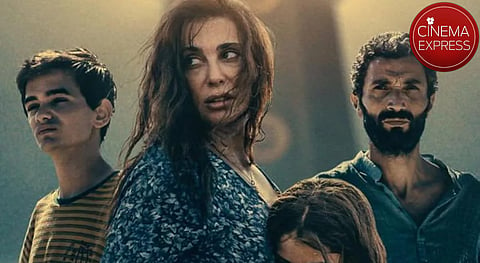The Sand Castle Movie Review: An imaginative survival story that speaks to a larger truth
The Sand Castle(3 / 5)
The Sand Castle is a curious film, purely by the way it makes your mind conjure questions. It isn’t your standard stranded-on-an-island survival tale. And the subtle thriller elements are so understated that you’re left to wonder if that’s mere delirium being experienced by the exasperated characters waiting to be rescued. What Matty Brown’s film succeeds in doing through its family of four is a slow building of tension; as the minutes tick by, you get a sense that something has to give here. The tiny island they are marooned on, the lone lighthouse that serves as shelter and a means to communicate with the outside world, the endless see about them – the claustrophobia of their very existence is frightening. The story has an abstract quality to it that unfolds through its frames. At its most tangible, The Sand Castle speaks to a larger truth about the horrific plight of migrant populations and refugees fleeing their war-torn lands in search of a better life. Yasmine (Nadine Labaki), the mother in the narrative, sums up their situation, as they wait on a cliff with their respective suitcases: “They should be here by now. They tricked us. If only we hadn’t paid the full amount.” Where they belong to or how exactly they got here (just the four of them, all by themselves) isn’t explained. The only information we have is that they are from the Middle East (from their Arabic) and the brief flashbacks confirm the bombs being dropped on their homeland.
Director – Matty Brown
Cast - Nadine Labaki, Ziad Bakri, Zain Al Rafeea, Riman Al Rafeea
Streaming On - Netflix
The radio picks up news about a meeting between the Turkish and Greek heads of state, with one of them confirming that a boat carrying migrants has capsized off the coast, with hundreds dead and many missing. Hints are dropped here and there to piece together a likely scenario. The narrative, per se, plays out in the form of a long metaphor, beginning with the desperate winding up of the light as an SoS signal to ships at sea. The father, Nabil (Ziad Bakri), is entrusted to get the manual motor started every evening for the light to operate. The revolving beam, the mayday radio message and the constant lookout for help represents the family’s last vestige of hope – and how too much of it can be a dangerous thing. A buried canoe in the sand, a red children’s shoe deep in the thicket and an elusive shadow appearing briefly are all connected to Jana (Riman Al Rafeea), the younger daughter. The lack of adequate information and the use of symbolism make this story an intriguing one.
Another overarching theme of The Sand Castle is parental protection. Jana is an imaginative young child who lives vicariously through the images in her head. Yasmine and Nabil wish to keep her innocence intact. Adam (Zain Al Rafeea), her older brother, retreats into himself, immersed in his Walkman, angry at his parents for failing to address the hopeless situation. As they go about their daily SoS rituals, they impress upon him to look out for his sister. The enormity of the struggle is captured in the film’s brilliant shots. The waves that gradually engulf the tiny patch of land represent that running out of time, in a sense. The Sand Castle is atmospheric, to say the least, and the elements close in on the hapless family. When survival is at stake, risks are paramount. Nabil and Adam swim out further into the sea in search of edible marine life. The former is gravely injured, placing more responsibility on Adam’s shoulders. Yasmine’s sheer force of will propels them forward each day, but even she begins to hallucinate (that Jana, who cannot swim, is drowning). With their parents incapacitated, the children are forced to fend for themselves.
The film, interestingly, blurs the line between imagination and reality, so as to keep that heavy word of hope afloat. It is in equal parts a gritty survival story and a fantasy tale. The former keeps you grounded with the family’s time-bound need to be saved. The latter is conjured to ensure that the mind doesn’t fall prey to despair. Unfortunately, it is this abstract quality (however engaging) that begins to let the film down. No form of closure is attained as you’re unable to tell the real from the imagined. You would want to hope that the children get to safety, but that’s an educated guess, at best. The film ends with a dedication to the 500 million children living in conflict zones the world over, forced to turn to their imagination in order to survive. Distressing, indeed!

